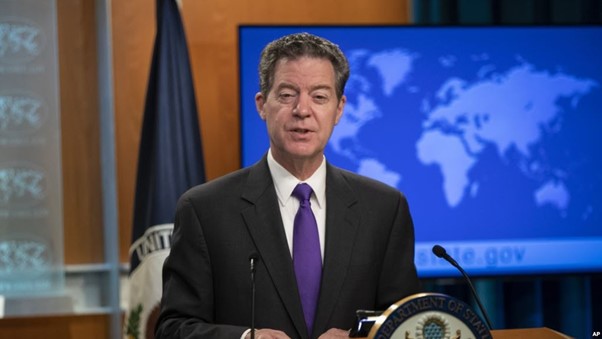Nigeria’s Response To Religious Violence Inadequate, Says US Govt

Justifying its recent classification of Nigeria as a country that violates religious freedom, the United States government has said the government does not do enough to curtail acts of violence.
During a special briefing held on Tuesday, the US Ambassador-at-Large for International Religious Freedom, Samuel D. Brownback, said Nigeria was freshly added to the list of violators because it tolerated “egregious acts” that were taking place in its states.
“And the Secretary [of State, Mike Pompeo] and really the world has great concern about what’s taking place in Nigeria at this time, and a number of terrorist groups are organising and pushing into the country,” he said.
“We’re seeing a lot of religious-tinged violence taking place in that country and indeed in West Africa. It’s an area of growing concern about what’s happening, in particular the tension that’s taking place there between religious groups. And it’s often the religious affiliation is used to try to recruit and inspire violent acts.”
Pompeo had, on Monday, included Nigeria in a list of 10 countries designated as “countries of concern under the International Religious Freedom Act of 1998 for engaging systematic, ongoing, egregious religious freedom violations”.
Nigeria’s government through the Ministry of Foreign Affairs said it received the news with surprise, considering that the country was both democratic and secular. The ministry cited provisions of the country’s constitution that said the government shall not adopt a state religion and which guaranteed citizens’ rights to the freedom of thought, conscience, and religion.
“Religious liberty in Nigeria has never been in question, therefore any claim contrary to that is completely false and untrue,” the government stated. “The ministry wishes to assure that the Nigerian government will engage the US government to express its displeasure and request that Nigeria be removed from the list.”
The US government, however, insists that that Nigerian government’s response to religious rights violations is not good enough.
Responding to questions from a journalist during Tuesday’s teleconference, Brownback cited expanded terrorist activities in Nigeria, which revolving around religious affiliations, as reason for the country’s blacklisting. This, he explained, is especially because “the government’s response has been minimal to not happening at all”.
“A number of cases – there have not been criminal cases brought forward by the government. The terrorism continues to happen and grow, in some places unabated,” he said.
“And we’re just very deeply concerned that there’s a completely inadequate response by the government taking place for the scale of what’s happening and the building up. We don’t want this place to devolve into a very difficult, lawless terrain in places.”
The Nigerian government must urgently act, Brownback said, adding that the US was ready to provide support. He added, however, that during previous visits to Nigeria by himself and officials of the State Department, they got inadequate responses from the government.
Other countries recently blacklisted by the US were Burma, China, Eritrea, Iran, North Kora, Pakistan, Saudi Arabia, Tajikistan, and Turkmenistan.
The designation of countries of particular concern is done every year based on the recommendations from the US Commission for International Religious Freedom, which may then be approved or rejected by the Secretary of State. Once a country is enlisted, the US President may impose a number of sanctions.
In its 2020 Global Terrorism Index released last November, the Institute for Economics and Peace had ranked Nigeria the third most terrorised country in the world.
“Boko Haram, Nigeria’s deadliest terrorist group, recorded an increase in terrorist activity mainly targeted at civilians by 25 per cent from the prior year. Additionally, Fulani extremists were responsible for 26 per cent of terror-related deaths in Nigeria at 325 fatalities,” noted IEP.
Nigeria had been ranked the third-worst country on this index since 2015, moving up from the fourth position in the previous year.
Support Our Journalism
There are millions of ordinary people affected by conflict in Africa whose stories are missing in the mainstream media. HumAngle is determined to tell those challenging and under-reported stories, hoping that the people impacted by these conflicts will find the safety and security they deserve.
To ensure that we continue to provide public service coverage, we have a small favour to ask you. We want you to be part of our journalistic endeavour by contributing a token to us.
Your donation will further promote a robust, free, and independent media.
Donate HereStay Closer To The Stories That Matter




